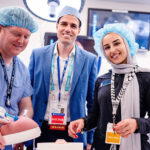Choosing fetoscopic spina bifida care for Hadley

When Katie and Derek learned in 2024 that their daughter Hadley would be born with spina bifida, they quickly set out to find the best care available. And as so often happens in parenting, their most important decision was to trust their instincts. Doing so led them to be among the first in New England to undergo fetoscopic spina bifida repair — a leap of faith they were willing to take.
“The more we learned about fetoscopic surgery, the more it seemed like the best choice,” says Katie. “We did it because we wanted to give Hadley the best chance. We did it for her.”
The decision to choose fetoscopic surgery
Spina bifida occurs when the spine doesn’t fully close during fetal development, and its severity can range from mild to life-threatening. In Hadley’s case, her spinal cord and nerves were exposed, a condition known as myelomeningocele, putting her at risk for nerve damage as well as bladder and mobility challenges.
Katie and Derek’s care team in Rhode Island recommended an open hysterotomy as treatment, a procedure that would fully open Katie’s uterus to access Hadley. While open hysterotomy is the most common surgical approach to treat spina bifida and other neural tube defects, Katie and Derek wondered if there were other options. They reached out to hospitals in other states. Boston Children’s was on their list, and within days, they met with the team at the Fetal Care and Surgery Center.
Led by fetal surgeon Dr. Alireza Shamshirsaz (Shami) and neurosurgeon Dr. Wes Northam, the team explained treatment options and each specialist’s role in Hadley’s care.
“This is what we wanted,” Katie says. “This is what we were looking for.”
An option the team considered was fetoscopic surgery, a less invasive alternative to open hysterotomy that avoids the need to fully open the uterus. Dr. Shami’s extensive experience with this relatively new procedure and Dr. Northam’s neurosurgery expertise gave Katie and Derek confidence that the approach would offer Hadley a better chance at mobility while reducing the risks for Katie.
“Even if it meant just a small chance for improvement in Hadley’s mobility, that was worth it for us,” Katie says.
Katie and Derek also appreciated that they had the final say about choosing fetoscopic surgery.
A team for life
In August 2024, the Fetal Care and Surgery Center team repaired Hadley’s back and spinal cord with specialized surgical instruments that accessed Katie’s uterus through three small incisions in her abdomen. Katie and Hadley recovered well but were closely monitored in a maternal-fetal medicine unit. The Boston Children’s team, including Dr. Shami, nurse practitioner Bonnie Zapolin, and maternal-fetal specialist Dr. Cassandra Duffy, kept in close contact.
“They were always available to answer our questions, no matter what time of day it was,” Katie says. “We never felt alone.”
On October 22, Hadley was born at almost 38 weeks. She was admitted to Boston Children’s NICU for observation, where Dr. Northam checked on her regularly to assess how she was healing post-surgery. After eight days, Katie and Derek brought Hadley home to her big sister, Brynlee.
Today, at 9 months old, she receives comprehensive care at Boston Children’s, including physical therapy, orthopedics, and urology visits — all focused on helping manage her spina bifida. The Fetal Care and Surgery Center continues to be a key part of her team, supporting her through her surgery and ongoing care.
“I call them Hadley’s guys,” Katie laughs.
Despite all she’s faced before even being born, Hadley is thriving. She’s curious, playful, and full of energy — and she gives great snuggles.
“She’s doing amazing,” Derek says. “Every milestone feels like a victory.”
Learn more about the Fetal Care and Surgery Center.
Related Posts :
-

The power of a second opinion for Merritt's spina bifida care
In March 2020 — at the height of the COVID-19 lockdown — Jenna, Brian, and their 2-year-old daughter Merritt were practically the only ...
-

Baby Isaac is thriving after an East Coast first for a neural tube defect
Isaac Suardi doesn’t know it yet, but he’s already made history. Just born in July, he’s the ...
-

Beyond expectations: Treating Isaac's teratoma through an EXIT procedure
Jennifer worked as a hairdresser until just days before delivering her son, Isaac, last December, even though she had planned ...
-

‘Zero place for mistakes’: Taking fetal surgery to the next level with simulation
The highly complex interventions involved in fetal surgery require exceptional skill, training, and experience. Beyond the procedures themselves, these surgical ...





